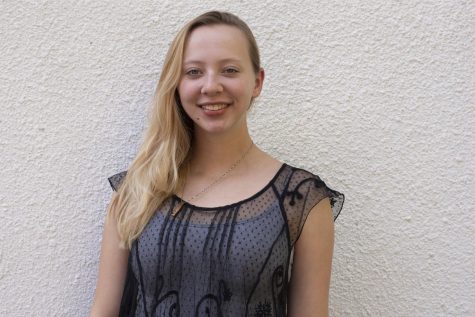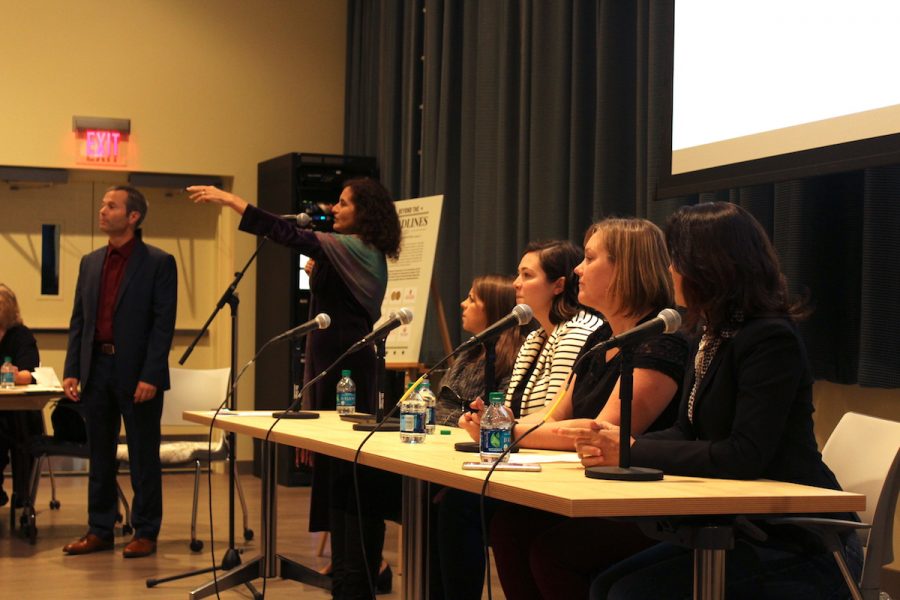‘Beyond the Headlines’ addresses how journalists cover poverty
Panelists discuss personal experiences with poverty and journalism
Photo by Madeline Fuerstenberg
Julian Emerson and Jan Larson spoke to the audience before introducing the panelists — Joy Smith, Joan McClane, Sarah Ferber and Dominique Broussard.
It is a journalist’s duty to frame a story in a way that connects with the readers, said Dominique Broussard, a professor in the UW-Madison Department of Life Sciences Communication.
“If you end up equating people to numbers, they end up losing their humanity,” Broussard said. “Make those numbers come alive.”
In front of an audience of about 120 people, four panelists sat to answer questions during Thursday night’s “Beyond the Headlines” event at the Pablo Center at the Confluence. The event was titled “Building Trust: Eau Claire and Its Journalists Engage in Poverty.”
This panel — moderated by Julian Emerson, a reporter at the Leader-Telegram — featured Broussard, Joan McClane, a staff writer with the Chattanooga Times Free Press; Joy Smith, a reporter with GateHouse Media; and Sarah Ferber, associate director of the Ex-incarcerated People Organization.
This segment of “Beyond the Headlines” — one of roughly a dozen events, according to Emerson — focused on the dynamic process of addressing poverty through a journalistic lens. Through a question-and-answer format facilitated by Emerson — Broussard, McClane, Smith and Ferber answered a fixed array of questions pertaining to the culture of poverty and journalism.
Through these questions, McClane and Smith recalled their experience reporting in-depth the cultural effects on poverty in Chattanooga, Tenn.
“We will never understand what they’ve overcome,” McClane said.
Ferber, a former convict and recovered drug addict, said she uses her own experiences with poverty to bring hope to others. She stressed the importance of fighting the stigma of poverty, as this often prevents people from seeking help.
Ferber said the fear of stigmatization and labeling often makes it “so hard” for people in poverty to move on with their lives.
“More people need to tell their story,” Ferber said. “But the stigma stops them.”
Using this point as a lesson to journalists, Ferber said it is important for reporters to be “authentic” in their writing. They should tell both sides of every story; the good and the bad, she said.
Ferber emphasized the importance of framing when it comes to topics like poverty and drug abuse in journalistic stories. While it is important to tell people about the bad stuff, it is also important for reporters to tell their readers that there are solutions to these issues, Ferber said.
“I want people to have hope,” Ferber said.
Branching off of Ferber’s points, Broussard emphasized the value in bringing life and realism to statistics. People process information and stories in different ways, depending on their background, Broussard said — people need to be able to visualize what they are being told.
“We don’t like statistics,” Broussard said. “When we read a story, that’s not going to be what we pay attention to. … Weave them into the story in a way that people will pay attention to.”
Michaela Peasall, a fifth-year secondary English education and Spanish liberal arts student, said she attended Thursday’s event despite not thinking about journalism that frequently.
“I thought it was extremely interesting,” Peasall said, “because I knew poverty and economic issues in Eau Claire were a big issue.”
Peasall said she felt it was important for people to attend and learn from events like “Beyond the Headlines” because citizens should feel responsible for being informed.
“That is our job, especially with the election coming up,” Peasall said. “Young people to old people should be informed on the issues.”
Fuerstenberg can be reached at [email protected].

Madeline Fuerstenberg is a fourth-year journalism student. This is her eighth semester on The Spectator staff and she’ll miss it with all her heart once she graduates (if she graduates).











